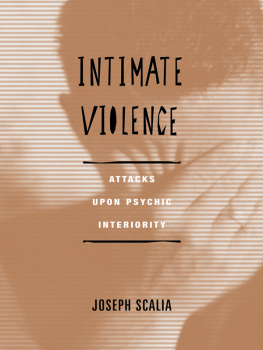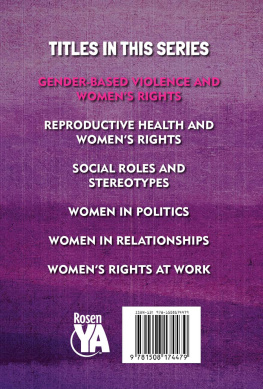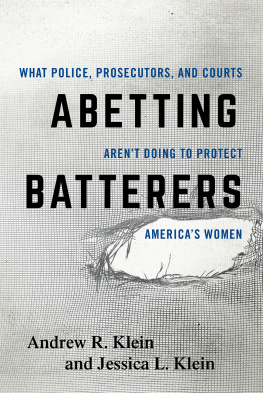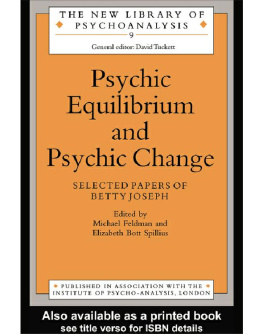INTIMATE VIOLENCE
INTIMATE VIOLENCE
ATTACKS UPON PSYCHIC INTERIORITY
JOSEPH SCALIA
COLUMBIA UNIVERSITY PRESS NEW YORK

COLUMBIA UNIVERSITY PRESS
Publishers Since 1893
New York Chichester, West Sussex
cup.columbia.edu
Copyright 2002 Columbia University Press
All rights reserved
E-ISBN 978-0-231-50629-8
The Power and Control Wheel, Education Groups for Men Who Batter,
by Ellen Pence and Michael Payman.
Copyright 1993 Springer Publishing Company, Inc., New York, NY 10012.
Used by permission.
Leaving the Island, from Blood, Tin, Straw,
by Sharon Olds. Copyright 1999 Sharon Olds.
Reprinted by permission of Alfred A. Knopf, a division of Random House, Inc.
Library of Congress Cataloging-in-Publication Data
Scalia, Joseph.
Intimate violence : attacks upon psychic interiority / Joseph Scalia.
p. cm.
Includes bibliographical references and index.
ISBN 0-231-11984-4 (cloth : alk. paper)
1. Family violencePrevention. 2. Abusive menPsychology.
3. Wife abusePsychological aspects. 4. Family violencePsychological aspects. I. Title.
RC569.5.F3 S27 2002
616.85822dc21
2001047365
A Columbia University Press E-book.
CUP would be pleased to hear about your reading experience with this e-book at .
CONTENTS
I dedicate this book to my wife, Lynne and my son, Joe who never cease to move me
I t is rather eye-opening to contemplate those who have been instrumental in one way or another in the development of this book, from its conception all the way through to its final form.
I wish to thank, first of all, Ric Kumm, founder and therapist of M.A.N. (Men Advocating Nonviolence), who had the idea and gave me the chance to work with batterers in the first place. We had no idea how much we would be affected by our patients, how much they would spark us to think things we never would have guessed.
Victor Stampley was a depth-thinking psychotherapist who helped me see my way clear to trusting myself in the thick of things early on. A little later, William Ryan, a psychologist, helped me further to dare to think. These are the Montanans. And there have been many very conscientious and serious psychotherapists here who have provided me with an intimate community of fellowship in which I have come of age.
In an era when it is under siege by those who have no understanding of it, psychoanalysis, in large part, gave me the conceptual tools that I used to identify and grapple with the issues addressed by this book. At the same time that I was deploying the methods and concepts of the Duluth Domestic Abuse Intervention Project, as well as those of Daniel Sonkin, Del Martin, Lenore Walker (1985), and Edward Gondolf (1985), I was beginning to study psychoanalysis.
Jan Middeldorf taught me how to find the human in the most disturbed and seemingly unreachable patients. Robert Marshall continued that education and provided unbending support and belief in me when in my thinking I dared to push the envelope; no daring consideration has ever been too much for him.
An early draft of this book was read and critiqued by Susan Nimmenheminda, who helped me along with its birthing.
Faye Peterson showed me how to think thoughts one would tend to shy away fromand how to do so with aplomb and curiosity. Marianne Spitzform was one of the first to show me the wedding of intellect, dogged pursuit, and serenity.
And Christopher Bollas. Bollas has been a teacher of great dimension and depth, with whom it is my fortune to walk together upon this good earth of ours. And, lately, James Grotstein has kept me honest and ensured a healthy measure of doubt and rethinking, again and again when need be.
I have been the grateful recipient of the much needed interest in and support of this book by John Michel at Columbia University Press; his warm and always unpretentious way of carrying his considerable force have been a pleasure.
Katharine Turok not only helped me learn how to write better, but she did so in the most affable and intelligent of ways.
LEAVING THE ISLAND
On the ferry, on the last morning of summer,
a father at the snack counter deep in the boat
gets breakfast for the others. Here, let me drink some of
Moms coffee, so it wont be so full
for you to carry, he says to his son,
a boy of ten or eleven. The boat
lies lower and lower in the water as the last
cars drive on, it tilts its massive
grey floor like the flat world. Then the
screaming starts, I carry four things,
and I only give you one, and you drop it,
what are you, a baby? a high, male
shrieking, and it doesnt stop, Are you two?
Are you a baby? I give you one thing,
no one in the room seems to move for a second,
a steaming pool spreading on the floor, little
sea with its own waves, the boy
at the shore of it. Cant you do anything
right? Are you two? Are you two?, the piercing
cry of the father. Go away,
go up to your mother, get out of here
he purser swabbing the floor, the boy
not moving from where the first word touched him,
and I could not quite walk past him, I paused
and said I spilled my coffee on the deck, last trip,
it happens to us all. He turned to me,
his lips averted so the gums gleamed,
he hissed a guttural hiss, and in
a voice like Gollums or the Exorcist girls when she
made that stream of vomit and beamed it
eight feet straight into the ministers mouth
he said Shut up, shut up, shut up, as if
protecting his father, peeling from himself
a thin wing of hate, and wrapping
it tightly around father and son, shielding them.
Sharon Olds (1999)
Upon referral and a medical records assessment of whether to accept Puck into a community residential treatment center, I was impressed by his apparent hunger to find a home, to have an unrequited longing honored. On meeting him for the first time, I was impressed with his warmth and sincerity. But near the end of his honeymoon at Constancy House, I was impressed by how determined he was to be ejected from the home, to see himself as victimized, whereas he was actually wreaking a kind of havocproving just how similar to his intimidating and abusive stepfather he could be. He became a demanding ogre, an irritable baby in the man-sized body of a fourteen year old. He soon had the staff and fellow residents paralyzed with fear. He was punching holes in walls of the house, intimidating teachers in the public school system, and was going to have to be discharged to a more secure facility if such actions were not reined in quickly: his probation officer, his child protection worker, and the executive director of the organization overseeing the group home collectively would not abide his misdeeds if his caretakers did not appear to have him in hand.
So how could I reach him? What did I know about him that could provide any clues? Not only did Puck never know his father, he did not even know who the man was; his mother refused to tell him, claiming this to be for his own good. For as long as he could remember, his stepfather had been there. Violent incidents with this manslapping, pushing, punching, and kicking when middle latency rendered lower-order violence inefficaciouswere commonplace throughout his life. Both parent and step-parent used drugs addictively, both were in and out of county jails for drug-related and various petty crimes. By the time Puck was eleven years old, he was in his first psychiatric hospital. There he was very violent and had to be physically restrained with a good deal of frequency. Both he and his only sibling were removed from parental care and became wards of the state by the time Puck was twelve. Though his mother had repeatedly and traumatically failed himshe found yelling and humiliation to be ready tools of control that cowed him and left him in angst, he maintained a tremendous allegiance to her, blaming the stepfather for everything
Next page








